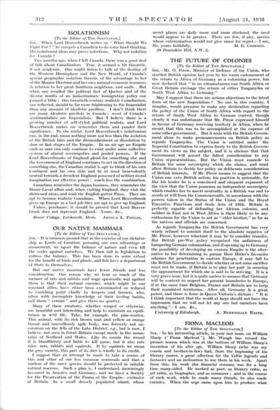ISOLATIONISM
[To the Editor of THE SPECTATOR.] Sun,—When Lord Beaverbrook writes on What Should We Fight For ? " he compels a Canadian to do some hard thinking. His isolationist ideas may prove infectious. Why not isolation for Canada ?
Two months ago, when I left Canada, there was a good deal of talk about Canadianism. True, it seemed a bit theoretic, if not academic. One might listen to talk of the destiny of the Western Hemisphere and the New World, of Canada's special geographic isolation therein, of the advantage to her of the Monroe Doctrine and her own natural economic resources in relation to her great Southern neighbour, and smile. But when one recalled the political fact of Quebec and of the diverse results of an indiscriminate immigration policy one paused a little ; this twentieth-century realistic Canadianism, one reflected, should be far more frightening to the Imperialist than any amount of idealistic pacifism. I don't think there are many idealistic pacifists in Canada ; most of Canada's sentimentalists are Imperialists. But I believe there is a growing number of self-styled political realists, and Lord Beaverbrook makes me remember them and ponder their significance. To the realist, Lord Beaverbrook's isolationism can, in the end, mean nothing more nor less than the isolation of the British Isles and the dismemberment or dissolution by slow or fast stages of the Empire. In an air age an Empire such as ours can only continue to exist under some collective system of shared sovereignties and pooled powers. If the Lord Beaverbrooks of England plead for something else and the Government of England continues to act in the direction of something else, the Canadian realist is apt to think of his own Continent and his own skin and be at most benevolently neutral towards a decadent England possessed of neither moral imagination nor effective power ; much less the combination.
Canadians remember the Japan business, they remember the Hoare-Laval affair and, when visiting England, they visit the distressed areas, and read the English gutter Press. They are apt to become realistic Canadians. When Lord Beaverbrook gives up Europe as a bad job they are apt to give up England.
Unless, perchance, it should be proved that Lord Beaver- brook does not represent England.—Yours, &c., Bower Cottage, Letchworth, Herts. ARTHUR L. PHELPS.






































 Previous page
Previous page